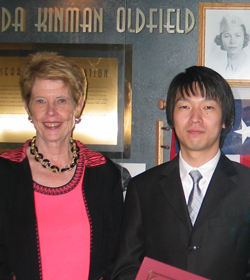 |
UNMC researcher Tomomi Kiyota, Ph.D., right, recipient of the 2008 Vada Kinman Oldfield Alzheimer’s Research Award, with Ardyce Bohlke, who is a former Nebraska State Senator and executive director of the Nebraska Dollars for Scholars organization — which the Kinman-Oldfield Family Foundation matches in funding Oldfield Award. |
And so — as has happened every year near her birthday since her death in 1999 — a UNMC researcher received the Vada Kinman Oldfield Alzheimer’s Research Award. The late Col. Barney Oldfield established the award in honor of his wife, who battled Alzheimer’s for 11 years.
This year’s recipient was Tomomi Kiyota, Ph.D., a postdoctoral researcher in the UNMC Department of Pharmacology and Experimental Neuroscience.
“We have to halt the progress of this disease and moderate the symptoms for those who suffer from it,” said Dr. Kiyota, as he became the 10th recipient of the Oldfield Award. A $10,000 stipend comes with the award.
Dr. Kiyota’s research focuses on a peptide called amyloid-beta (AB), which can gather in the brain, decrease memory function and contribute to Alzheimer’s progression.
In mouse models, Dr. Kiyota studies how the brain clears itself of these peptides and how this clearance process is hindered in those with Alzheimer’s disease.
|
Dr. Kiyota’s recent findings have significant implications for future Alzheimer’s therapy, said Tsuneya Ikezu, M.D., Ph.D., Dr. Kiyota’s mentor and recipient of the 2000 Oldfield Award.
“I’m very pleased to see Dr. Kiyota receive the Oldfield Award,” Dr. Ikezu said. “He is a rising star in Alzheimer’s research and I expect much more from him in the future.”
Also at Monday’s ceremony, pharmaceutical sciences graduate student Daniel Flaherty of Holdrege, Neb., became the fourth recipient of the Nancy and Ronald Reagan Alzheimer’s Scholarship Fund Award for his research into potential pharmaceutical therapeutics for Alzheimer’s disease.
The Kinman-Oldfield Family Foundation established the Reagan award to honor the late president, who battled Alzheimer’s for 10 years. Oldfield met Reagan in 1939 and later became his publicist. The award recognizes scientists for promising research into Alzheimer’s disease and comes with a $5,000 stipend.
In his research, Flaherty investigates compounds that may battle against and regulate the same harmful AB peptides studied by Dr. Kiyota.
|
Flaherty is deserving of the award and — even as a graduate student — he’s already shown potential to be a great researcher, Dr. Vennerstrom said.
Former State Sen. Ardyce Bohlke is executive director of the Nebraska Dollars for Scholars organization — which the Kinman-Oldfield Family Foundation matches in funding the awards each year. She said the work being done by Dr. Kiyota and Flaherty fits the motivation behind the Oldfields’ gifts.
“These awards are meant to fund research that provides hope for those with Alzheimer’s and the work of these two scientists certainly does that,” Bohlke said.